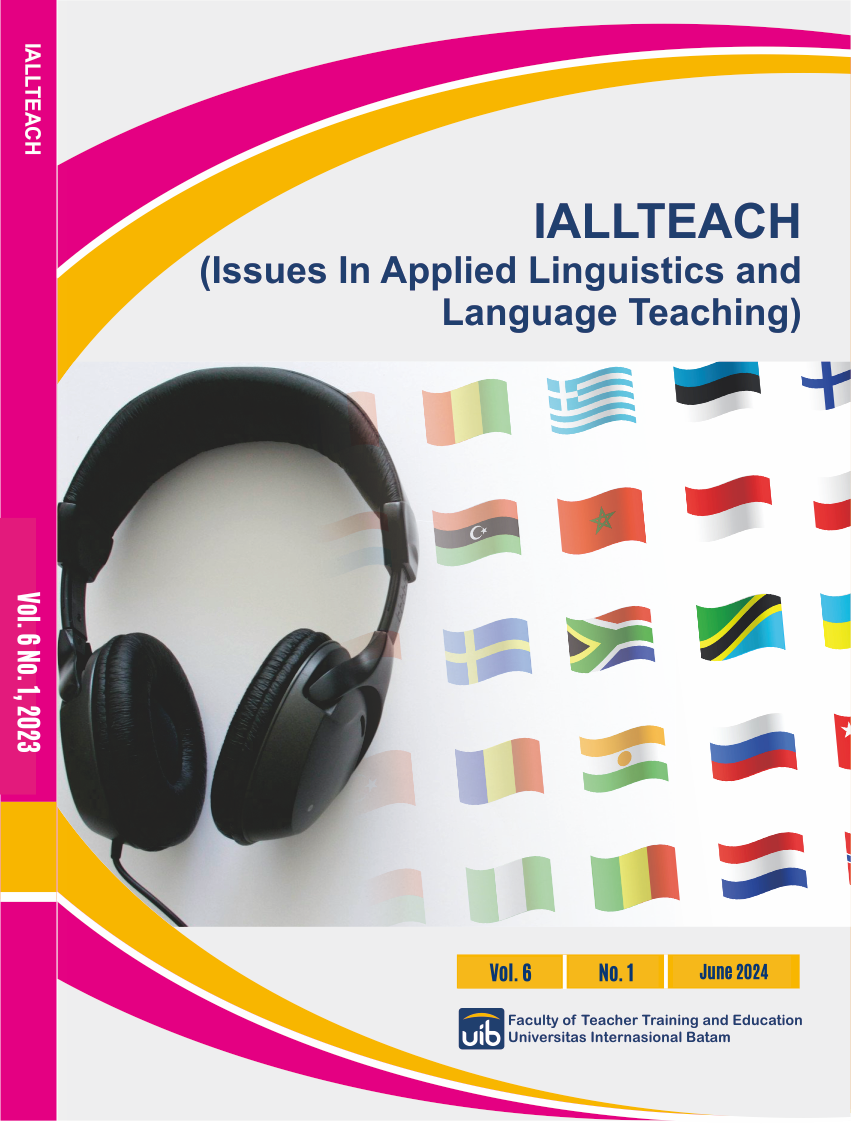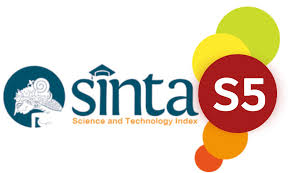Foklore: Enhancing Character Education in EFL Classroom
DOI:
https://doi.org/10.37253/iallteach.v6i1.9314Keywords:
Character Education, EFL Classroom, FolkloreAbstract
Folklore, as a significant component of literature, is extensively utilized in foreign language teaching within classroom settings. Integrating character education into the classroom is essential for holistic student development. This study aims to provide a comprehensive examination of the criteria for selecting appropriate folklore as well as to identify effective strategies for implementing folklore integrated with character education. This research adopts a conceptual approach to explore the use of folklore integrated with character education, addressing the what, why, and how aspects. This topic remains underexplored in the existing literature. The effective strategies for incorporating folklore and character education in English language classes, including interactive storytelling, role-playing, writing prompts, reading folklore, and research projects. The study concludes that integrating folklore and character education can lead to a holistic educational experience that enhances both language proficiency and cultural awareness. The implications suggest that educators should integrate the implementaion of folklore in the class to achieve target language and moral values objectives effectively.
Downloads
References
Abdi. (2023, May 26). Tujuan Pendidikan Karakter di Indonesia dan Nilai-Nilai yang Harus Diajarkan. liputan6.com. https://www.liputan6.com/hot/read/5294359/tujuan-pendidikan-karakter-di-indonesia-dan-nilai-nilai-yang-harus-diajarkan
Agung, A. S. S. N., Suryaman, M., & Sayuti, S. A. (2024). A viewpoint on folklore education: Providing students freedom and empowerment. Journal of Education and Learning (EduLearn), 18(1), Article 1. https://doi.org/10.11591/edulearn.v18i1.21035
Alisherovna, A. N. (2024). Nationally Specific and Culture-Relevant Phraseological Units as Components of the National World Picture. Journal of Science, Research and Teaching, 3(5), Article 5.
Ardi, W. (2019). The Utilization of Folklores and the Happy Strategy to Improve English Speaking Skill and Self Concept (best Practices for Nonformal Education).
Bauman, Z. (2013). Culture in a Liquid Modern World. John Wiley & Sons.
Booth, A., Sutton, A., Clowes, M., & James, M. M.-S. (2021). Systematic Approaches to a Successful Literature Review. SAGE.
Calzada, S. M. (2013). Reading as a Means of Promoting Social Interaction: An Analysis of the Use of Literature Circles in Efl Teaching.
Dahal, H., & Bhatta, B. (2021). Folktales: A Moral Message from the Past to the Future Generation. Nepal Journal of Multidisciplinary Research (NJMR), 4(1). https://doi.org/doi.org/10.3126/njmr.v4i1.36618
Darmayenti, D., Besral, B., & Yustina, L. S. (2021). Developing EFL religious characters and local wisdom based EFL textbook for Islamic higher education. Studies in English Language and Education, 8(1), Article 1. https://doi.org/10.24815/siele.v8i1.18263
Ellisafny, C. A. P. (2019). Learning Folklore Using English Language Teaching (ELT) Materials for Students. Culturalistics: Journal of Cultural, Literary, and Linguistic Studies, 3(2), 13–17. https://doi.org/10.14710/culturalistics.v3i2.6607
Fadhli, M. (2020). Indonesian Folktales in English: Media to Integrate Local Wisdom in Efl Classroom. Lingual Journal of Language and Culture, 10(2), 1–5.
Griswold, W. (2012). Cultures and Societies in a Changing World. SAGE.
Inphoo, P., & Nomnian, S. (2019). Dramatizing a Northeastern Thai Folklore to Lessen High School Students’ Communication Anxiety. PASAA: Journal of Language Teaching and Learning in Thailand, 57, 33–66.
Ismail, I. (2019). The Impact of Interactive Reading Using Local Folktales Stories in Supporting Students’ Vocabulary Achievement in Indonesian EFL Learners. MAJESTY JOURNAL, 1(2), 25–37. https://doi.org/10.33487/majesty.v1i2.119
Johan, R. C., Cahyani, I., Wibisono, Y., & Novian, R. M. (2021). Knowledge Conversion on Naracerita: The Students’ Inheritance of Digital Folklore Based on Media. Library Philosophy and Practice, 1–12.
Kemdikbud, B. (2017). Penguatan Pendidikan Karakter.
Kristiawan, D., Ferdiansyah, S., & Picard, M. (2022). Promoting Vocabulary Building, Learning Motivation, and Cultural Identity Representation through Digital Storytelling for Young Indonesian Learners of English as a Foreign Language. Iranian Journal of Language Teaching Research, 10(1), 19–36.
Laksana, S. D. (2021). View of Pentingnya Pendidikan Karakter Dalam Menghadapi Teknologi Pendidikan Abad 21. Jurnal Teknologi Pembelajaran (JTeP), 1(1). https://journal.iaimnumetrolampung.ac.id/index.php/jtep/article/view/1289/679
Lubis, F. K., & Bahri, S. (2021). Enhancing Students’ Literacy Competence Through Writing Bilingual Folklore Book by IT: Process Approach. Randwick International of Education and Linguistics Science Journal, 2(1), Article 1. https://doi.org/10.47175/rielsj.v2i1.205
Marhayani, D. (2016). Development of Character Education Based on Local Wisdom in Indegenous People Tengahan Sedangagung. Journal of Education, Teaching and Learning, 1(2), 66–70.
Morris, R. V. (2023). Folklore: Democratizing Source Material to Reflect Classroom and Community Culture. The Social Studies, 114(2), 78–90. https://doi.org/10.1080/00377996.2022.2088672
Mutiarani, M., & Rahman, I. A. (2019). Indonesian Folklore Animation as English Learning Media and Students’ Character Education for Primary School. SEMNASFIP, 0, Article 0. https://jurnal.umj.ac.id/index.php/SEMNASFIP/article/view/5119
Nadeak, L., Simbolon, M., Sihotang, R. Y., & Sembiring, Y. B. (2020). MORAL VALUE AND CHARACTERS BUILDING EXPOSED IN FOLKLORE OF TONGKAT TUNGGAL PANALUAN. Jurnal Pendidikan Bahasa Inggris Undiksha, 8(2), Article 2. https://doi.org/10.23887/jpbi.v8i2.30969
Nanda, D. D., Simbolon, B., Damanik, F. A., & Sembiring, Y. B. (2021). Moral Value and Character Building Education in Folklore from Central Java “Timun Mas.” Journal of Languages and Language Teaching, 9(1), 85–91. https://doi.org/10.33394/jollt.v9i1.3319
Nurhayati, Amrullah, Fitriana, & Awalunisah, S. (2019). The Storytelling Method Based on Local Wisdom on Moral Values of 5-6 Years Old Children. 393–397. https://doi.org/10.2991/icei-19.2019.92
Pardede, P. (2021). A Review of Current Conceptual Research on Short Stories Use in EFL Classrooms. Journal of English Teaching, 7(1), Article 1. https://doi.org/10.33541/jet.v7i1.2595
Rochmiyati, S., Ghozali, I., & Tiasari, L. (2020). The Character Values-Based Folklores as Teaching Resources to Support English Acquisition. Journal of Educational and Social Research, 10(3), 159. https://doi.org/10.36941/jesr-2020-0056
Shaleha, M. A., & Purbani, W. (2019). Using Indonesian Local Wisdom As Language Teaching Material to Build Students’ Character in Globalization Era. KnE Social Sciences, 292–298. https://doi.org/10.18502/kss.v3i10.3910
Situmorang, S., Sinaga, D. S., & Simbolon, S. (2023). Exploring Belief Values in Batu Umang Folklore: A Cultural Analysis of Durin Tani Village, Sibolangit District, Deli Serdang Regency. Jurnal Ilmu Pendidikan Dan Humaniora, 12(2), Article 2. https://doi.org/10.35335/jiph.v12i2.32
Syukri, M., Mytra, P., & Amin, F. H. (2022). BUILDING COMMUNITY THROUGH LOCAL DRAMA ACTIVITIES IN THE CLASSROOM. Lentera Pendidikan : Jurnal Ilmu Tarbiyah Dan Keguruan, 25(2), Article 2. https://doi.org/10.24252/lp.2022v25n2i15
Tineh, S., Rorintulus, O. A., & Wuntu, C. N. (2023). Integrated Skill in English Language Learning: Examining Folklore-Implemented Teaching Toward EFL Students’ English Skill. Edumaspul: Jurnal Pendidikan, 7(2), Article 2. https://doi.org/10.33487/edumaspul.v7i2.7054
Widiyanto, A., Suyitno, I., & Supana. (2022). Five Main Values of Character Education in Jaka Tingkir Folklore. Journal of Positive School Psychology, 298–312.
Winatha, K. R., Meinarni, N. P. S., & Willdahlia, A. G. (2020). Adopting Indonesian Folklore as an Instructional Media Through Cards Games. JTP - Jurnal Teknologi Pendidikan, 22(3), Article 3. https://doi.org/10.21009/jtp.v22i3.17428




.png)






